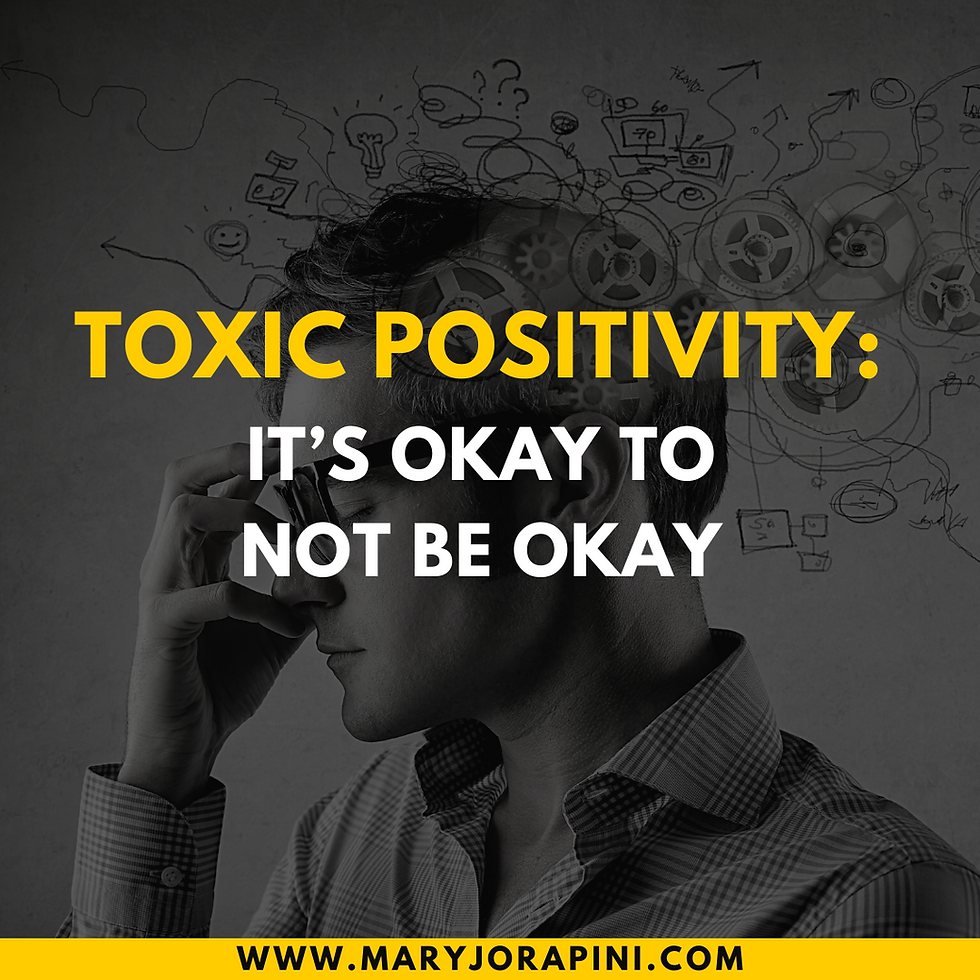Toxic Positivity: It’s Okay To Not Be Okay

Staying positive during uncertain times is important, unless it means denying what you really feel to fit in with how you think you should feel. Losing touch with reality and pretending you’re happy when your world is on the brink of disaster is not mentally healthy. If you’ve ever been around someone who seems to have lost touch with reality, you understand how difficult it can be to be honest and authentic with that person.
Nothing worthwhile in life happens without sacrifice and to suffer is part of the human condition. If you try to escape the sad parts of life or avoid the difficult issues, you end up living a very superficial existence. Life is messy and a crucial skill is learning to accept and process grief, because trying to deny it or avoid it leads to more suffering.
Toxic positivity is a term used when there is an overgeneralized happiness or optimism that leads to denial of what is true. It invalidates real feelings if they are not upbeat or happy. If you are forcing positive vibes on everyone, including yourself, you’re denying genuine human feelings of uncertainty or suffering and not being honest with yourself or others.
Signs of toxic positivity may present like this:
Feeling guilty for feeling what you feel
Hiding or masking your true feelings
Minimizing other’s feelings or experiences with feel good quotes instead of listening honestly to them
Shaming others for what they feel if it’s not positive
Telling someone to just get over it
Toxic positivity is destructive to individual’s health for several reasons.
It causes shame. When you don’t feel upbeat and positive and you suppress bad feelings, you’re no longer being your real self. You are acting “fine” to be accepted. This causes a deep anxiety about whether they will discover your real feelings. We all make mistakes and have regrets.
You distance yourself from people. Acting upbeat all the time is exhausting. Therefore, you are less likely to spend time with people and conserve your emotional energy. You begin feeling like a fraud whenever you’re with people.
Relationships with others become more superficial. When you’re not your real self, you make fewer real friends. You’ll worry if they really knew you, they wouldn’t want to be around you. Therefore, you’ll attract relationships that aren’t well connected or fulfilling. Relationships thrive on vulnerability; you can’t be vulnerable if you can’t own your positive and negative feelings.
It’s important to establish balance between good and bad feelings while maintaining a sense of optimism and hope for the future. Here are some methods of achieving that balance.
Resist the urge to make how you feel look pretty. Feelings go up and down - embrace the mess.
Avoid labeling or judging people based on how they feel. Feeling are not right or wrong, they just are. You can judge actions but not feelings.
Stop faking it. It’s important to set boundaries and protect your ability to feel. Making yourself fake being happy to please others or appear okay uses precious energy that is much better spent being real.
Humans have a diverse array of emotion. Just as the children’s story The Velveteen Rabbit encourages staying real, we need to stay in touch and protect our “realness.” To give up your true feelings is to give up the essence of what makes you, you. Nothing is worth that.
Wordle and Dordle have similar word and letter tactics. The linked articles below provide further information regarding the impacts of different Wordle techniques.
EPTU Machine ETPU Moulding…
EPTU Machine ETPU Moulding…
EPTU Machine ETPU Moulding…
EPTU Machine ETPU Moulding…
EPTU Machine ETPU Moulding…
EPS Machine EPS Block…
EPS Machine EPS Block…
EPS Machine EPS Block…
AEON MINING AEON MINING
AEON MINING AEON MINING
KSD Miner KSD Miner
KSD Miner KSD Miner
BCH Miner BCH Miner
BCH Miner BCH Miner